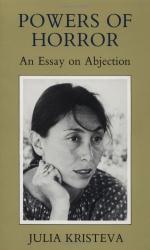|
This section contains 940 words (approx. 3 pages at 400 words per page) |

|
Perspective
Kristeva is firmly within the post-modernist literary and linguistic movement. Post-modernism is largely founded on the insights of a Swiss linguist named Ferdinand de Saussure. Saussure developed a theory of language according to which meaning was the result of difference and exclusion. A sign—like a word—has meaning only if it does not mean something else. "Cat," for example, has the meaning that it does because it is not any other word. Structuralists believed, however, that there was some ultimate foundation for language which gave the entire system meaning. Post-modernism (which is closely related to another philosophy called post-structuralism) rejects this last belief; they believe that language is fundamentally completely arbitrary and that there is no final ground of meaning. Instead, language is purely a social construct. As they believe that language is the only way one can understand the world (including, even, one's self...
|
This section contains 940 words (approx. 3 pages at 400 words per page) |

|




